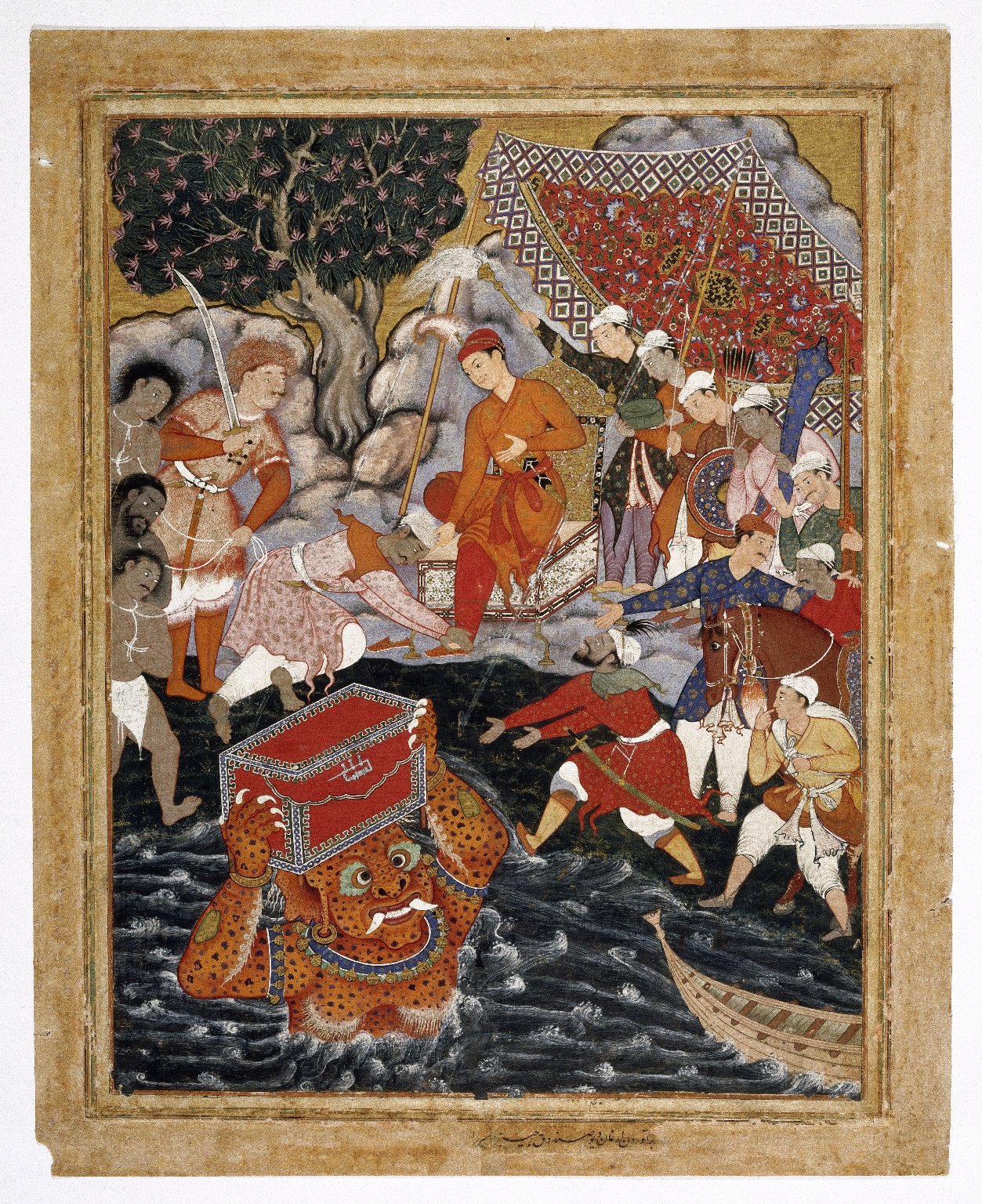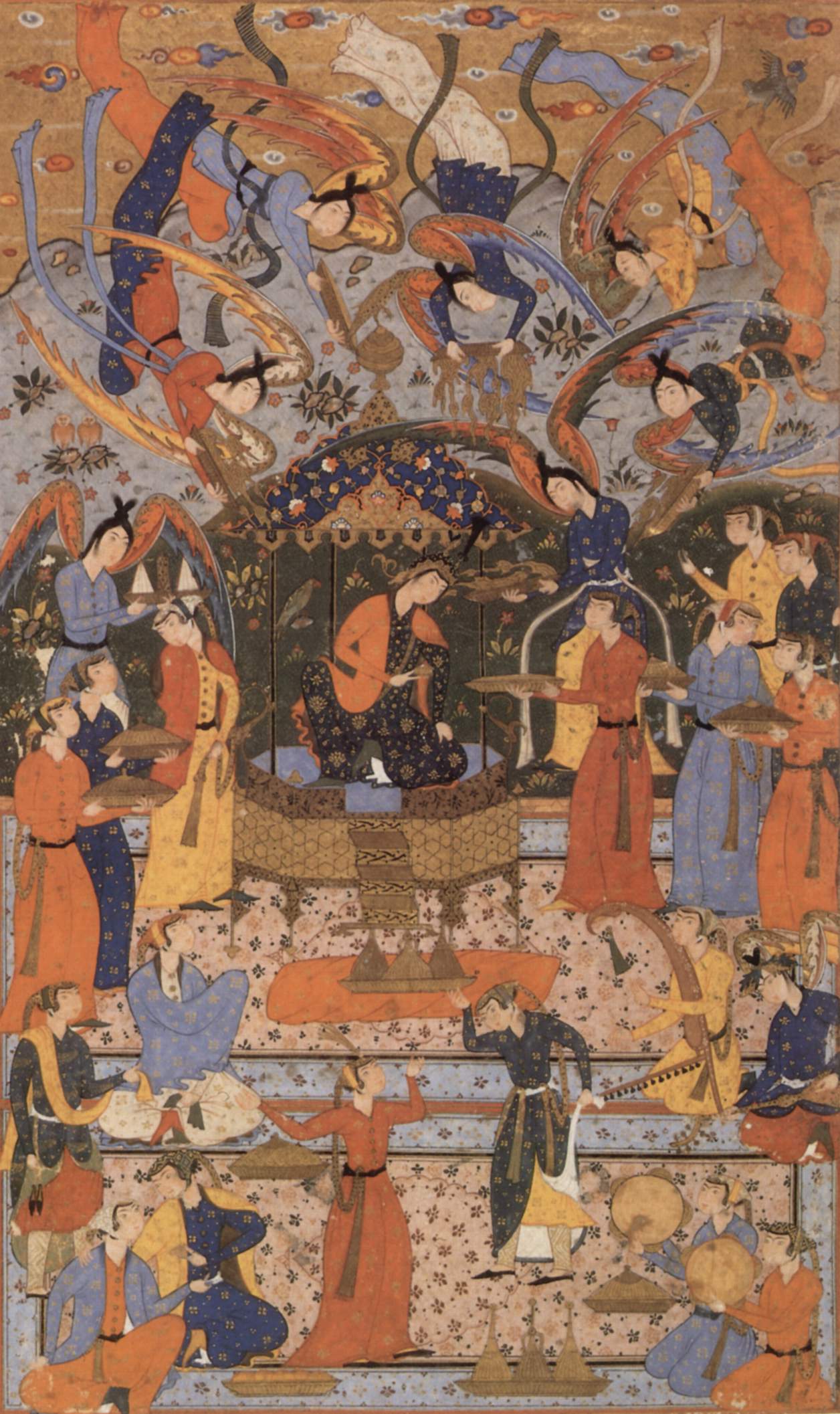|
Ifrit
Ifrit, also spelled as efreet, afrit, and afreet (Arabic: ': , plural ': ), is a powerful type of demon in Islamic mythology. The afarit are often associated with the underworld and identified with the spirits of the dead, and have been compared to evil ''geniī loci'' in European culture.Edward Westermarck ''Ritual and Belief in Morocco: Vol. I (Routledge Revivals)'' Routledge, 23 Apr 2014 p. 387 In Quran, hadith, and Mi'raj narrations the term is always followed by the phrase ''among the jinn''. In later folklore, they developed into independent entities, identified as powerful demons or spirits of the dead who sometimes inhabit desolate places such as ruins and temples. Their true habitat is the underworld.Chelhod, J., “ʿIfrīt”, in: Encyclopaedia of Islam, Second Edition, Edited by: P. Bearman, Th. Bianquis, C.E. Bosworth, E. van Donzel, W.P. Heinrichs. Consulted online on 06 October 2019 First published online: 2012 First print edition: , 1960-2007 Etymology T ... [...More Info...] [...Related Items...] OR: [Wikipedia] [Google] [Baidu] |
Jinn
Jinn ( ar, , ') – also romanized as djinn or anglicized as genies (with the broader meaning of spirit or demon, depending on sources) – are invisible creatures in early pre-Islamic Arabian religious systems and later in Islamic mythology and theology. Like humans, they are accountable for their deeds, can be either believers (''Muslim'') or unbelievers (''kafir''); depending on whether they accept God's guidance. Since jinn are neither innately evil nor innately good, Islam acknowledged spirits from other religions and was able to adapt spirits from other religions during its expansion. Jinn are not a strictly Islamic concept; they may represent several pagan beliefs integrated into Islam. To assert a strict monotheism and the Islamic concept of ''Tauhid'', Islam denies all affinities between the jinn and God, thus placing the jinn parallel to humans, also subject to God's judgment and afterlife. The Quran condemns the pre-Islamic Arabian practise of worshipping the ... [...More Info...] [...Related Items...] OR: [Wikipedia] [Google] [Baidu] |
Islamic Mythology
Islamic mythology is the body of myths associated with Islam and the Quran. Islam is a religion that is more concerned with social order and law than with religious ritual or myths. ''The Oxford Companion to World Mythology'' identifies a number of traditional narratives as "Islamic myths". These include a creation myth and a vision of afterlife, which Islam shares with the other Abrahamic religions, as well as the distinctively Islamic story of the ''Kaaba''. The traditional biography of the Islamic prophet Muhammad, who plays a central role in Islamic teachings, is generally recognized as being largely historical in nature, and Islam depends less on mythology than Judaism and Christianity. However, the canonical narrative includes two key supernatural events: the divine revelation of the Quran and the Isra and Mi'raj — the night journey to Jerusalem followed by the ascension to the Seventh Heaven. In addition, Islamic scriptures contain a number of legendary narratives abo ... [...More Info...] [...Related Items...] OR: [Wikipedia] [Google] [Baidu] |
Gabriel
In Abrahamic religions ( Judaism, Christianity and Islam), Gabriel (); Greek: grc, Γαβριήλ, translit=Gabriḗl, label=none; Latin: ''Gabriel''; Coptic: cop, Ⲅⲁⲃⲣⲓⲏⲗ, translit=Gabriêl, label=none; Amharic: am, ገብርኤል, translit=Gabrəʾel, label=none; arc, ܓ݁ܰܒ݂ܪܺܝܐܝܶܠ, translit=Gaḇrīʾēl; ar, جِبْرِيل, Jibrīl, also ar, جبرائيل, Jibrāʾīl or ''Jabrāʾīl'', group="N" is an archangel with power to announce God's will to men. He is mentioned in the Hebrew Bible, the New Testament, and the Quran. Many Christian traditions — including Anglicanism, Eastern Orthodoxy, and Roman Catholicism — revere Gabriel as a saint. In the Hebrew Bible, Gabriel appears to the prophet Daniel to explain his visions (Daniel 8:15–26, 9:21–27). The archangel also appears in the Book of Enoch and other ancient Jewish writings not preserved in Hebrew. Alongside the archangel Michael, Gabriel is described as the g ... [...More Info...] [...Related Items...] OR: [Wikipedia] [Google] [Baidu] |
Bilqis
The Queen of Sheba ( he, מַלְכַּת שְׁבָא, Malkaṯ Šəḇāʾ; ar, ملكة سبأ, Malikat Sabaʾ; gez, ንግሥተ ሳባ, Nəgśətä Saba) is a figure first mentioned in the Hebrew Bible. In the original story, she brings a caravan of valuable gifts for the Israelite King Solomon. This account has undergone extensive Jewish, Islamic, Yemenite and Ethiopian elaborations, and it has become the subject of one of the most widespread and fertile cycles of legends in the Middle East. Modern historians identify Sheba with both the South Arabian kingdom of Saba in present-day Yemen and Ethiopia. The queen's existence is disputed among historians. Narratives Biblical The Queen of Sheba ( he, מַלְכַּת שְׁבָא, Malkaṯ Šəḇāʾ, in the Hebrew Bible; grc-koi, βασίλισσα Σαβά, basílissa Sabá, in the Septuagint; syr, ܡܠܟܬ ܫܒܐ; gez, ንግሥተ ሳባ, Nəgśətä Saba), whose name is not stated, came to Jerusalem "w ... [...More Info...] [...Related Items...] OR: [Wikipedia] [Google] [Baidu] |
Solomon In Islam
Sulaimān ibn Dāwūd ( ar, سُلَيْمَان بْن دَاوُوْد, ) was, according to the Quran, a ''malik'' (, ) and '' nabī'' (, ) of the Israelites. Generally, Islamic tradition holds that he was the third king of the Jewish people and a wise ruler of Israel. In Islam, Solomon is regarded as one of the prophets of God who was bestowed with many divine gifts, including the ability to speak to both animals and ''jinn''; he is also said to have enslaved the '' shayāṭīn'' (, ) and the '' dīv'' (, ) with the support of a staff given to him by God. Muslims further maintain that he remained a faithful monotheist throughout his life; reigned justly over the whole of the Israelite nation; was blessed with a level of kingship that was given to none before him nor after him; and fulfilled all of his commandments, being promised nearness to God in ''Jannah'' (, ) at the end of his life. Since the rise of Islam, various Arab historians have regarded Solomon as one of t ... [...More Info...] [...Related Items...] OR: [Wikipedia] [Google] [Baidu] |
Ghost
A ghost is the soul or spirit of a dead person or animal that is believed to be able to appear to the living. In ghostlore, descriptions of ghosts vary widely from an invisible presence to translucent or barely visible wispy shapes, to realistic, lifelike forms. The deliberate attempt to contact the spirit of a deceased person is known as necromancy, or in spiritism as a '' séance''. Other terms associated with it are apparition, haunt, phantom, poltergeist, shade, specter or spectre, spirit, spook, wraith, demon, and ghoul. The belief in the existence of an afterlife, as well as manifestations of the spirits of the dead, is widespread, dating back to animism or ancestor worship in pre-literate cultures. Certain religious practices—funeral rites, exorcisms, and some practices of spiritualism and ritual magic—are specifically designed to rest the spirits of the dead. Ghosts are generally described as solitary, human-like essences, though stories of ghostly armies ... [...More Info...] [...Related Items...] OR: [Wikipedia] [Google] [Baidu] |
Brooklyn Museum - Arghan Div Brings The Chest Of Armor To Hamza
Brooklyn () is a Boroughs of New York City, borough of New York City, coextensive with Kings County, in the U.S. state of New York (state), New York. Kings County is the most populous Administrative divisions of New York (state)#County, county in the State of New York, and the County statistics of the United States#Most densely populated, second-most densely populated county in the United States, behind New York County (Manhattan). Brooklyn is also New York City's most populous borough,2010 Gazetteer for New York State United States Census Bureau. Retrieved September 18, 2016. with 2,736,074 residents in 2020. Named after the Dutch village of Breukelen, Brooklyn is located on the western portion of Long Island and shares a border with the borough of Queens. ... [...More Info...] [...Related Items...] OR: [Wikipedia] [Google] [Baidu] |
38-40
The .38-40 Winchester is actually a .40 caliber (10 mm) cartridge shooting .401" (10.2 mm) caliber bullets. The cartridge was introduced by Winchester in 1874 and is derived from their .44-40 Winchester. This cartridge was introduced for rifles, but in its reintroduction for Cowboy Action Shooting it has seen some popularity as a revolver cartridge. It is not particularly well suited to hunting larger game, but it was popular when it was introduced, along with the previous .44-40 Winchester, for deer hunting. It can be used successfully on smaller game animals, and for self-defense. Current loadings are intended for revolvers. Design and history It is unclear why this cartridge was introduced, as it is very similar to the .44-40 from which it was derived. It has approximately less muzzle energy, and has a muzzle velocity about less than the .44-40. The bullet differs by only .026 inches in bullet diameter and in standard bullet weight from the original .44-40. Th ... [...More Info...] [...Related Items...] OR: [Wikipedia] [Google] [Baidu] |
Muhammed
Muhammad ( ar, مُحَمَّد; 570 – 8 June 632 CE) was an Arab religious, social, and political leader and the founder of Islam. According to Islamic doctrine, he was a prophet divinely inspired to preach and confirm the monotheistic teachings of Adam, Abraham, Moses, Jesus, and other prophets. He is believed to be the Seal of the Prophets within Islam. Muhammad united Arabia into a single Muslim polity, with the Quran as well as his teachings and practices forming the basis of Islamic religious belief. Muhammad was born approximately 570CE in Mecca. He was the son of Abdullah ibn Abd al-Muttalib and Amina bint Wahb. His father Abdullah was the son of Quraysh tribal leader Abd al-Muttalib ibn Hashim, and he died a few months before Muhammad's birth. His mother Amina died when he was six, leaving Muhammad an orphan. He was raised under the care of his grandfather, Abd al-Muttalib, and paternal uncle, Abu Talib. In later years, he would periodically seclude h ... [...More Info...] [...Related Items...] OR: [Wikipedia] [Google] [Baidu] |
Muhammad Al-Bukhari
Muhammad ( ar, مُحَمَّد; 570 – 8 June 632 CE) was an Arab religious, social, and political leader and the founder of Islam. According to Islamic doctrine, he was a prophet divinely inspired to preach and confirm the monotheistic teachings of Adam, Abraham, Moses, Jesus, and other prophets. He is believed to be the Seal of the Prophets within Islam. Muhammad united Arabia into a single Muslim polity, with the Quran as well as his teachings and practices forming the basis of Islamic religious belief. Muhammad was born approximately 570CE in Mecca. He was the son of Abdullah ibn Abd al-Muttalib and Amina bint Wahb. His father Abdullah was the son of Quraysh tribal leader Abd al-Muttalib ibn Hashim, and he died a few months before Muhammad's birth. His mother Amina died when he was six, leaving Muhammad an orphan. He was raised under the care of his grandfather, Abd al-Muttalib, and paternal uncle, Abu Talib. In later years, he would periodically seclude h ... [...More Info...] [...Related Items...] OR: [Wikipedia] [Google] [Baidu] |
Al-Ibshihi
Al-Ibshīhī ( ar, مُحمَّد بن أحمد بن منصور الأبشيهي المحلي) (1388-1448) was an Egyptian writer born in the small town in the Governorate of Gharbeya, in the Nile Delta. Works Al-Ibshīhī's best known work is the ''Kitāb al-Mustaṭraf'' more fully known as ''Mustaṭraf fī kull fann mustaẓraf'' ('A Quest for Attainment in Each Fine Art'). As characterised by the ''Encyclopædia Britannica'', this was 'a very individual encyclopaedia ... that covered the Islamic religion, conduct, law, spiritual qualities, work, natural history, music, food, and medicine. At the turn of the Arab fortunes, al-Ibshīhī had recapitulated all that was best in their culture'.Robert L. Collison and Warren E. PreeceHistory of encyclopaedias, ''Encyclopædia Britannica''. Editions * al-Ibshīhī. ''al-Mustaṭraf fī kull fann mustaẓraf''. 2 vols. Beirut: Dār Maktabat al-Ḥayāh, 1992. References 1388 births 1448 deaths 14th-century Arabic writers 15th-ce ... [...More Info...] [...Related Items...] OR: [Wikipedia] [Google] [Baidu] |



.jpg)


.jpg)